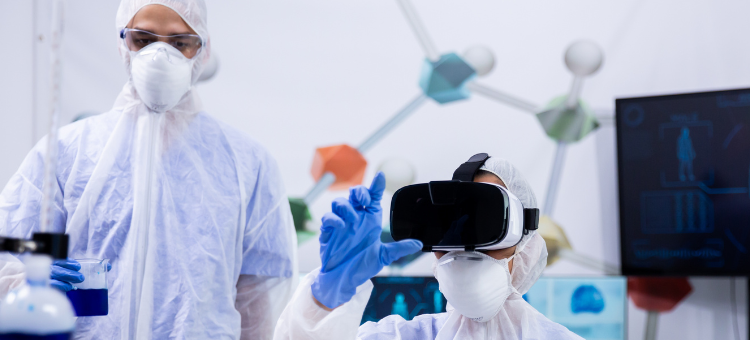Unveiling the Potential of Artificial Intelligence in Medical Research

Artificial Intelligence (AI) has rapidly emerged as a disruptive and transformative force across diverse industries, fundamentally reshaping how we live and conduct business. In recent years, it has also made significant strides in medical research, particularly in clinical trials conducted by Contract Research Organizations (CROs).
This blog explores the immense potential of AI in medical research, highlighting its ability to streamline processes, enhance decision-making, accelerate drug development, and ultimately improve patient outcomes.
Let’s Discuss Some Potential of Artificial Intelligence in Medical Research
Disease Diagnosis and Early Detection
Precise and timely diagnosis constitutes the fundamental pillar of comprehensive healthcare. Diagnostic systems have demonstrated remarkable capabilities in identifying diseases with greater precision and speed. Machine learning models on massive datasets of medical images, such as X-rays, MRIs, and CT scans, can recognize patterns that may elude the human eye. This capability is crucial in detecting diseases like cancer, where early diagnosis can significantly improve treatment outcomes and survival rates.
Drug Discovery and Development
Drug discovery and development is complex, time-consuming, and expensive. AI technology has emerged as a valuable tool in streamlining the process. These algorithms can predict drug efficacy and side effects.
Personalized Medicine
Traditionally, medical treatments have been based on a one-size-fits-all approach, but we now understand that individuals respond differently to various interventions. AI can help personalize medicine by analyzing an individual’s genetic makeup, lifestyle factors, and medical history to tailor treatments to their needs. This approach can lead to more effective therapies, reduced side effects, and improved patient outcomes.
Predictive Analytics and Patient Monitoring
AI-powered predictive analytics can be instrumental in forecasting disease outbreaks, identifying high-risk patients, and optimizing healthcare resource allocation. Moreover, continuously monitoring patients’ health parameters can help detect deteriorating conditions early, enabling timely interventions and preventing adverse events.
Enhancing Surgical Procedures
Robot-assisted surgeries have become a reality with technology integration in the operating room. AI-powered surgical robots offer incredible precision, stability, and skill, allowing surgeons to perform complex procedures more accurately. Furthermore, these robots can assist surgeons during operations by providing real-time data and suggestions, reducing human errors, and enhancing patient safety.
Medical Image Analysis
AI’s role in medical image analysis extends beyond diagnosis. Machine learning algorithms can use in segmenting and quantifying different anatomical structures, facilitating treatment planning, and providing valuable insights for clinicians. This technology is particularly beneficial in neurology, cardiology, and radiology.
Drug Repurposing and Combination Therapy
Algorithms can analyze existing drugs and their interactions with various biological targets. By repurposing approved drugs for new therapeutic uses or identifying combinations of drugs that work synergistically, CROs can quickly identify potential treatments for diseases with unmet medical needs.
Managing and Analyzing Medical Records
The abundance of electronic health records (EHRs) presents opportunities and challenges. AI can help healthcare providers manage and analyze these vast datasets, extracting valuable information for research purposes, identifying trends, and improving decision-making processes.
Improving Mental Health Care
Chatbots and virtual therapists are being developed to provide mental health support and counseling. These tools can offer personalized assistance, monitor patients’ emotional well-being, and provide interventions in times of crisis.
Efficient Data Collection and Analysis
Accurate data collection and analysis are essential for successful medical research. Automation can streamline these processes by automating data extraction from various sources, such as electronic health records, wearable devices, and medical imaging. AI algorithms can efficiently identify relevant information, categorize data, and perform preliminary analyses, enabling researchers to focus on interpreting results and making informed decisions.
Precise Protocol Development
AI can also contribute to developing precise research protocols. Algorithms can identify patterns, predict potential risks, and suggest optimized trial designs by analyzing existing medical literature, patient data, and treatment outcomes. This approach helps researchers design more effective protocols, reducing the likelihood of errors and improving the overall quality of clinical trials.
Accelerating Drug Development
The traditional drug discovery and development process is lengthy and expensive. It has the potential to significantly expedite this process by improving target identification, lead optimization, and drug repurposing efforts.
AI-powered algorithms can analyze vast volumes of biological and chemical data efficiently, identifying potential drug targets and predicting the efficacy of various compounds. Simulating drug interactions and conducting virtual screening can narrow the pool of potential candidates, reducing the time and cost involved in laboratory experiments. Moreover, AI-powered platforms can assist in predicting drug toxicity, optimizing dosing regimens, and designing clinical trials with higher chances of success.
Improving Patient Outcomes
At its core, medical research aims to improve patient outcomes and enhance overall healthcare. It has the potential to bring personalized medicine to fruition, tailoring treatments to individual patients based on their unique characteristics and needs.
Researchers can uncover patterns and correlations that were previously challenging to identify by analyzing genomic data, patient medical records, and real-time monitoring devices. This analytical approach can lead to more accurate diagnoses, personalized treatment plans, and improved patient care. It can also contribute to developing predictive models forecasting disease progression, allowing for early interventions and targeted therapies.
Ethical Considerations and Challenges
While AI offers immense potential in medical research, it also poses ethical considerations and challenges. Privacy and data security are paramount when dealing with sensitive patient information. Clear guidelines and robust safeguards must be in place to protect patient confidentiality and prevent unauthorized access or misuse of data. Additionally, the transparency and interpretability of algorithms are crucial to ensure accountability and avoid biased or discriminatory outcomes. Ethical frameworks and regulatory oversight should guide the development and deployment of systems in medical research.
Conclusion
AI has immense potential to revolutionize medical research conducted by CROs, transforming how clinical trials are conducted and accelerating drug development. Streamlining processes, enhancing decision-making, and improving patient outcomes, can pave the way for more efficient, cost-effective, and personalized healthcare solutions. However, addressing challenges in data privacy, ethics, and algorithmic bias is crucial to ensure responsible and equitable integration into medical research. With continued advancements and collaboration between medical professionals, we can unlock new frontiers in understanding and treating diseases, leading to better patient outcomes worldwide.









